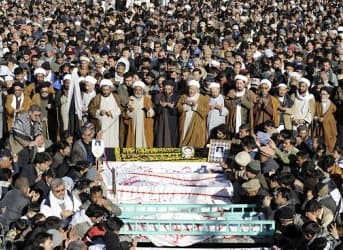Rural populations oftentimes feel neglected by their officials ensconced in the capital.
Getting their attention is difficult, requiring creative thinking to engender publicity to force bureaucrats to pay attention to their plight and redress complaints.
Such problems are magnified in developing countries, where bloated, corrupt bureaucracies prove recalcitrant to most options available to the public, save bad publicity.
Consider Pakistan, whose shambolic energy industry is failing to keep abreast of the country’s rising demands for reliable electricity. Problems that plague Pakistan's power sector are unlikely to diminish even as the caretaker government has agreed in principle to reform the sector as conditions under the International Monetary Fund bailout requirements.
Simply, put, the country’s ramshackle and investment starved private power companies have roughly 50 percent less electricity generation capability than the actual demand, leaving Pakistan’s National Grid facing more than a 5,000-megawatt shortfall in power generation, leading to blackouts (referred to in the Pakistani press as “load shedding”) in both urban and rural areas of the country.
Related article: Damn the Sanctions and Bring on the Gas, says Pakistan
Pakistan currently produces roughly 11,000 megawatts of electricity, but the country needs more than 17,000 megawatts of power to meet the rising demand of a growing population.
How bad are things? The country’s crisis peaked on 24 February, when a fault at one power station cascaded into multiple plant shutdowns and plunged the entire nation into darkness, with authorities warning that the power crisis would worsen as the summer approached. Two months ago, “load shedding” led to blackouts of up to 18 hours in urban areas and up to 22 hours of outage in rural areas.
Compounding the government’s woes are huge losses due to poor performance of assets and massive power theft, which is estimated by officials from the Water and Power Ministry to be close to 45 percent.
Not that Islamabad hasn’t seen the problem coming – eight years ago a government planning commission warned in its energy security plan that unless power production capacity is increased by 143 gigawatts by 2030, it would not be possible for the country to sustain higher economic growth rates, and that Pakistan needed $8 billion in private power project investment to meet its medium-term target.
Now, tribal elder villagers in northwestern Pakistan’s Lakki Marwat district have decided to embarrass the government on an international scale, staging a protest demonstration on 10 June and turning away polio-eradication medical teams.
Tensions over the polio inoculation teams rose exponentially after news leaked in 2011 after U.S. forces killed bin Laden that a Pakistani physician in Abbotabad employed by the CIA was using a vaccination program to gather intelligence on the al Qaeda leader. In March Pakistani authorities temporarily suspended a local four-day polio vaccination program in Kaggawala village on the outskirts of Peshawar after gunmen shot dead a female polio worker and wounded another.
Lakki Marwat is a southern district of Khyber Pakhtunkhwa Province that borders the tribal region of South Waziristan.
Lakki Marwat village elder Zaitullah Betanai said that the polio inoculation teams will not be permitted until the central government accepts the villagers' demands, telling reporters, "There is an electricity supply line but no electricity, and there is no electricity transformer in the area. We have no mosquito kits and no spray against mosquitoes is arranged so far. Also, there is no ambulance in the area. We want the government to address the four demands immediately."
Lakki Marwat’s defiance quickly drew Islamabad’s attention, with government official Gul Zardar saying, "All their just demands will be addressed. The elders are now discussing the situation with the political agent and we shall continue until their demands are addressed and ensure every child gets polio drops."
Related article: Total to Pay $398.2 Million in Damages for Bribing Iranian Officials
ADVERTISEMENT
Pakistan is one of three nations worldwide, along with Afghanistan and Nigeria, where polio has yet to be eradicated, where massive international efforts to eradicate the disease have yet to succeed.
The question that Islamabad has yet to address is why the villagers of Lakki Marwat have to put their children’s health at risk from polio and mosquito-borne disease to even acquire access to the nation’s electrical grid? No doubt the villagers of Lakki Marwat, given what they currently have, would be happy even if “load sharing” of more than 20 hours a day meant that they had electricity for the remaining four hours. As it is, they have none.
The administration of Pakistan's new Prime Minister Nawaz Sharif is facing some nasty choices, especially if the Lakki Marwat protests succeed – blackouts or international PR black eyes, both self inflicted.
Quite aside from irritating the electorate, electricity shortages cost the Pakistani economy more than $13 billion a year, according to a recent survey, which notes that the lack reliable electricity dampens economic growth by 1.5 percent annually.
By. John C.K. Daly of Oilprice.com


















